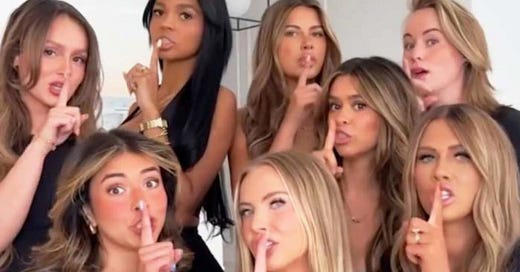Shhh no one tell the men they are misbehaving... it's a secret.
The real secret of the lives of Mormon wives is... internalized misogyny.
Note: I just wrote a whole write up about Season 2 of The Secret Lives of Mormon Wives. Then I went back and read the article I wrote after Season 1 back in September and realized I had the exact same thing to say after both seasons. Only I like the Season 1 write up more. So I’m posting this one with an added section with Season 2 commentary in the middle. Enjoy! And spill all your Season 2 thoughts in the comments!
I, along with millions of others across the world, tuned into The Secret Lives of Mormon Wives this past week.
Having been a Mormon wife myself for 12 years,1 beachy hair waves and coconut cream-ed sodas are part of my cultural heritage. So I was only too happy to watch our secrets of over-sized labias and exorbitant brand deals exposed at last.
Representation matters.
I’ll admit this is the first season of reality TV I’ve ever finished. (I’m not like other girls). Call me naive, but I’m persistently vexed at how far reality TV strays from its one self-proclaimed descriptor: reality.
There was one plot line in the show however that did seem quite real to me: that of Jen and Zac Affleck’s marital dynamics.
When Jen was dragged to a surprise Chippendale’s show in Vegas she felt so guilty that she left before the show started and immediately called her husband to confess her sin of having fun friends.
Zac responded in a very calm, measured way. Just kidding. He yelled that she was a terrible mother, threatened divorce and called her disgusting. When she begged to see him he responded that he definitely did not want to see or talk to her. That is until he was finished gambling her money away thank you very much, at which point he would consent to continue his treatise on what a garbage human she is.
Maybe the reason this plot line seemed real was because Jen very clearly did not want any of Zac’s poor behavior captured. Throughout the show she is a valiant warrior on a doomed mission to cover for this man.
At the end of one interview you can hear the producer whisper “Can we talk about Zac’s gambling?” To which Jen whispers back, “Um… yeah we can talk about it as long as we don’t make him out to sound like an addict.”
“I know Zac has a lot of flaws and can be a bit controlling, but his issue is that he loves and cares too much.”
“I’ve never met anyone who loves me more than Zac.”
It also feels real because in the week since the show has come out, so has an orchestrated effort by Zac’s family to clear his good name:
Wait. I think I’ve seen this film before. Why does this feel so familiar?
Oh yeah because that other time Mormons were in the news this summer, THIS EXACT SAME THING HAPPENED!!
When Daniel Neeleman’s behavior was reported on—interrupting his wife, taking over an interview meant for her, speaking on her behalf, manipulating her into a first date, trumping her ballet dreams with his career dreams — it wasn’t Daniel who took accountability for any of his behavior.
Instead, his family—his wife’s sister, his father, his friends, but especially his wife—rose up to clear his good name and uphold his reputation.
Like Jen Affleck, Hannah Neeleman took to Instagram to assure everyone that she is married to the best man, she is so happy, treated so well and this is all a huge misunderstanding.
In both cases, despite the man himself displaying his own poor behavior on a public stage, it is the wife who claims center stage as she covers her husband.
She assumes the role of magician’s assistant- stuffing her husband’s indiscretions inside a box and making them disappear in the hopes the audience breaks into applause for him. Ta-da! With a smile on her face, she transforms her own mistreatment into mere illusion.
In defense of our petty queens
Since I’ve chosen to make this article about internalized misogyny (the female side) instead of plain old misogyny (the male side), perhaps it seems I am unfairly pointing the finger at women2.
It behooves me to state on the record that I am rooting for these women. In fact I feel very defensive of them3.
I’ve spoken before about the intense pressure on a Mormon woman to be simultaneously a 1950s June Cleaver wife-mother-servant-maid AND a Jessica Rabbit sex goddess.
The Mormon Wives of this show have risen up and fulfilled their godly duty. They have checked the checkboxes assigned to them: Get married young. Check. Pop out lots of babies. Check. Support your husband. Check. Look sexy as hell. Check!
And are they rewarded for dutifully accomplishing all of their assigned tasks? No! The world does nothing but shit on them for it.
I didn’t even have to watch the show to encounter a tirade of internalized misogyny surrounding it. Including my own. (Did I mention I’m not like the other reality TV watching girls?)
The IMDB reviews of the show are full of reviewers calling these women “trashy,” “toxic,” “petty,” “stupid,” “disgusting,” and “the very worst of humanity.”
“These girls are are so annoying and air-headed they are unwatchable.”
“I got stupider just from watching the trailer.”
“Taylor is too dumb to not say the quiet parts out loud… she’s like a dumb dog.”
Isn’t it interesting that collectively we consider programming depicting women fighting about relationships to be filthy garbage juice while programming depicting men fighting about a ball is a celebrated national past time?
The Internalized Misogyny Scale (IMS)
Fifteen years ago a group of researchers at the University of Tennessee wished to measure the link between internalized misogyny and psychological distress, but to do so they needed a way to codify internalized misogyny.
So they came up with the Internalized Misogyny Scale or IMS. It consists of ranking how strongly you agree or disagree with 17 statements divided into three main categories:
The devaluation of women.
The distrust of women.
Valuing men over women.
You yourself can take the test and score your own internalized misogyny here.
Despite the fact that “the distrust of women” could be the subtitle of most reality TV shows, our discussion today will hone in on that last factor: valuing men over women.
Specifically how the women in The Secret Lives of Mormon Wives value men’s reputations over women’s reputations.
By valuing men’s reputations over their own, women keep men from experiencing the natural consequences of their actions.
The book Codependent No More articulates this predicament beautifully.
Jen Hatmaker summarizes it well:
“…codependency is taking responsibility for someone else’s choices by curating their environment so they won’t feel the discomfort from their choices… so they don’t have to experience their own consequences.”
One byproduct of internalized misogyny is the inclination for women to prioritize making men comfortable. Even when he messes up, shielding him from his own guilt or shame. This is usually meant as an act of kindness or support, but what it ends up accomplishing is keeping men from experiencing the natural consequences of their actions.
Thus keeping them from growth.
“Each person is responsible for himself… We allow people to be who they are. We give them the freedom to be responsible and grow… If people have created some disasters for themselves, we allow them to face their own proverbial music.” - Melodie Beatty Codependent No More
In every episode of The Secret Lives of Mormon Wives, the wives take turns playing DJ- remixing her husband’s proverbial music into something easier on the ear.
In episode one Whitney confesses to lying about the real reason for her family’s move to Hawaii. They had used the excuse of avoiding a swinging scandal, but really it was because Whitney’s husband Connor was outed online for sending nudes on Tinder.
It takes Whitney less than 10 seconds to rush to her husband’s defense: “There was more to it than that. He had been struggling with a porn addiction. [starts crying] I didn’t want to say anything… There’s a reason why people do certain things… he was just confused.”
The first thing she says when she stops crying is, “I hope you don’t look at Connor differently.”
People looking at you a little differently would be a natural consequence of going on a dating app behind your wife’s back.
Taylor’s boyfriend Dakota has a history of sleeping around especially in the beginning of their relationship. Consequently Taylor’s friend Mayci does not trust him.
Instead of allowing Dakota to deal with this consequence of his actions, Taylor asks Mayci (not Dakota) to reach out and talk to him. Could she make an effort to be kinder to Dakota and give him another chance?
It’s clear Taylor takes the weight of her boyfriend’s infidelity on herself when she tearfully says, “I feel like if I was good enough, he wouldn’t have done that to me.”
Jen takes responsibility for Zac’s actions in big and small ways throughout the series.
Big way: when Zac gambles away all the money his family loans him for medical school, instead of allowing him to face the consequences of those actions by earning back that money on his own, Jen steps in to fund his medical school with her money.
Small way: when Zac awkwardly says to Demi and Jessi “It’s not that I don’t like your husbands…” Jen immediately jumps in to soften it with, “He just doesn’t feel like he personally knows you guys!”
These girls are hyper concerned over their husband’s reputations, but hardly concerned over their own. Nobody on the show has any problem dragging the women’s reputations through the mud.
And no man on the show swoops in to take accountability for his wife’s sullied reputation.
On the contrary, despite Jen’s repeated Herculean efforts to shine up Zac’s name, Zac’s family dirties hers at the first opportunity:
"I'm extremely disappointed in Hulu, his wife, and these fake girls.... I pray for my brother, and others deeply affected by this nonsense." - Zac's brother AJ (on Instagram)
In addition to taking accountability for the men’s behavior, the women are quick to take accountability for their own:
When Whitney publicly alludes to Demi’s private bedroom behavior, Demi is upset but says, “I take full accountability that I opened that can of worms.”
When Taylor’s Dad reprimands her, “You shouldn’t have gotten pregnant.” Taylor immediately responds, “That’s true.”
When Jen un-invites four friends from her baby blessing because Zac told her to, she takes accountability saying, “That is my fault. I should have been better at communicating with Zac.”
In Season 2 holding women accountable reaches a fever pitch
If I were to write up all the instances where the women tell other women to “take accountability” in season two, this article would be a book.
It was… a lot.
If I were to write up all the instances where the men are told to take accountability, I would write about one instance.4
Even though The Secret Lives of Mormon Wives is a show ostensibly about women, and even though the women certainly get more screen time; the men’s comfort, reputations, opinions, desires and trustworthiness are valued over the women’s time and again.
No where is this imbalance more clear than the weight, time and attention given to the women’s “sins” vs the men’s.
Mikayla and Jace
Mikayla’s husband Jace got her pregnant and then married her when she was 16 and he was 21. We also find out this season that Mikayla was sexually abused by her Mom’s boyfriend for years, causing her eventually to move out when she was 15.
Jace impregnating and marrying a 16 year old is mentioned once very briefly in Mikayla’s introduction in episode one of season one and then never brought up or discussed ever again.
Meanwhile, Mikayla holding a grudge against Whitney is brought up and discussed ad nauseam.
Taylor and the swinging scandal
The swinging scandal is brought up in every single episode from both seasons one and two, and repeatedly we see Taylor cry, apologize, take accountability for cheating on her ex-husband.
Taylor’s fall from grace over the swinging scandal brought fierce and intense backlash online that lasted for years and is still on-going.
Meanwhile, we don’t even know the NAME of the man who slept with her in the swinging scandal. It’s never brought up. Taylor is so careful to completely blame herself and never point the finger at him.
But this is how she told the story on the podcast The Viall Files:
*head’s up - description of sexual assault - skip if you need.
Taylor: [describing a party the three couples involved in the soft swinging were at] “I get drunk. I black out within the first 10 minutes and I’m like ‘I gotta go.’ So I call a friend to pick me up.”
[She goes to her friend’s house. The husband who is not her husband calls to ask if he can come over.]
“I’m belligerent. Like, I’m drunk… So the guy comes over and we hook up at my friend’s house. And I don’t remember much of it. I won’t say, like I don’t want to call it anything, but I just don’t remember much of it. I was pretty blacked out. But I cannot say like what had happened in that room. I do know I slept with him. I woke up very messed up down there. And that was really, really bad” *starts crying “Sorry I don’t know if I’ve fully healed from that yet because that’s just so shitty to do to someone.”
Oh did you think she is talking about the man who took advantage of her while she was black out drunk being shitty? No. She’s talking about herself. The shitty thing she did was be sexually assaulted.
And no one will ever forgive her for it. Least of all herself.
This man’s name is never brought up. He has taken no public accountability. While Taylor takes full responsibility. And has faced a massive public fall out with millions calling her a selfish home-wrecker.
Taylor, Dakota and Taylor’s family
Throughout Taylor and Dakota’s relationship, Taylor takes accountability for her part in their relationship problems, which mostly revolve around her “trust issues” because she doesn’t believe that Dakota is telling the truth about hooking up with a girl in the beginning of their relationship.
In Season 2, Taylor’s fears are confirmed- Dakota has been lying throughout their two year relationship.
Despite this, Taylor’s family still somehow place the blame for Dakota lying about sleeping at another girl’s house onto Taylor.
Her step-dad says, “I’m gonna be blunt freaking honest- he just told me that he had seen you three times and then you’re sitting there telling me that he came over and had sex with you- What does that say about YOU?!”

Then Taylor immediately nods, starts crying and agrees, “I was trash.”
Then Taylor’s brother interrupts her to lecture her about “not giving 100%” to her relationship to Dakota instructing her to“Just sacrifice a little bit.”
Dakota chimes in “And when you’re asking me to come over, what does that tell me as a guy?”
Once the show aired and people understandably spoke out against Taylor’s family, instead of letting them feel that sting of the natural consequence of their actions of slut shaming their daughter, Taylor quickly tells everyone not to judge them. She posts this to Instagram:
"I know this is a harsh scene. Believe me when I say my FAMILY is my biggest support system. There was a lot going on and emotions were heightened. They have held me at my lowest EVERY TIME. Hard moment for us all. I love them. We all cried watching. I promise they are the ones always here for me."
Jen and Zac Affleck
When I wrote my last article, I hadn’t seen the transcript from a text exchange between Jen and Zac in Vegas when Zac was gambling and threatening divorce over Jen almost seeing a Chippendale’s show. I will include it now because it fits so well into our topsy-turvy patriarchy accountability discussion.
Here’s a screenshot of Jen’s phone some sneaky cameraman scanned past which the internet has since translated. Pay attention who gets called upon to take accountability for their action.
Jen texts: “…[can’t read] I was happy to leave and I had no interest in being there in the first place.”
Zac texts: “Seriously, I don’t want to hear one more time about your heart. Start taking accountability for your actions and for the situations you put yourself in. Your a grown woman, it doesn’t matter your intentions. You were there, and that’s the image you portray of yourself, family, church etc. Everyone you represent on this platform.
The fact that you would have to ask me is retarded. Would you ever find Katie asking Kyle that? No because she respects her own values and her husband and would never put herself in that situation. The fact that we are even having this conversation is sad. Especially after everything with the temple.
Do you realize how dumb you would look saying you're a worthy temple recommend holder [can't read] and then being at a male [can't read]."5
Zac’s abusive behavior from season one is barely mentioned in season two. Instead, lots of time and attention is devoted to Jen “lying.”
Frankly, given the eagerness with which Jen jumps to defend Zac and how quickly he and his family were to blame Jen for Zac’s sullied reputation, we all should have seen Season 2’s attempted Zac Affleck redemption arc coming.
And who makes the redemption arc possible? Jen. Of course. Jen is cast as the problematic, distrustful liar this season in order to cast Zac in a better light.
Of course.
These two things are true at the same time: 1. men are victims of this system. 2. men need to be held accountable for their actions.
These two things are also true at the same time: 1. women are victims of this system. 2. women need to be aware of the explicit and subtle ways we hold up this system.
Everyone needs the opportunity to learn.
As if Demi knew I was going to write this article, she gives a real gem of a quote when Whitney leaves the table after hurting some of the girls’ feelings. Someone asks if they should follow her, and Demi says no:
“She needs to feel the sting of what her actions can do to people so that she understands what that feels like. Because it doesn’t feel good. That’s below the belt stuff.... She needs to learn not to do that moving forward." - Demi
Nailed it. But feeling the sting of your actions is something women should not reserve only for other women.
Like Demi says, when we keep people from feeling the sting of their actions, we ensure they will not learn from their mistakes.
Do you enjoy thinking about and discussing all things patriarchy and feminism?? Cool me too. Come discuss with me and the Matriarchal Blessing community by becoming a paying subscriber. Our next gathering will be in July and we will be discussing Ruth Whippman’s book BoyMom.
Alternatively, you could also just pay me for my work just cause, that is also very cool and very appreciated! Thank you!
Currently an ex-Mormon wife for 5+ years.
May I kindly refer you to like…. all of my other articles?
It’s so rich watching all the Mormons get their panties in a twist desperately trying to stop these women from sullying the good name of Mormonism. Ha! Mormons have done a fine job of sullying their own name by shaming the fudge out of these women.
It was when Jordan went full protector-mode and screamed “TAKE OWNERSHIP!” into the face of a man who bumped into another man’s wife.
If no one else will hold Zac responsible for his horrid treatment of his wife, I volunteer.






















I haven’t finished Season 2, much of the reason being how difficult it is to watch these beautiful women support and celebrate the male gaze while pretending to be free-thinkin’, rule-bustin’ rebels while upholding every male-oriented norm. I wish they could see how much potential they have. Thank you for another insightful, smart article!
We women do this all the time. In my circle we rarely talk about our husband's or our marital relationships as in general it's taboo. If complaining or unhappiness with one's husband is voiced it is immediately followed with a litany of their good points or how it's not really a problem. I have done this myself so many times it's embarrassing. I have done it i(n the past - I've quit🙂) out of fear of being punished for it which is grounded in reality. Mostly from other women (I imagine this is from a fear of being punished from participating in what is seen as disloyalty). This is of course how much domestic abuse is hidden. However there are so many ways of undermining women that are embedded in men's consciousness because of societal conditioning that it is like the old metaphor - the onion and the interminable peeling back of the layers.